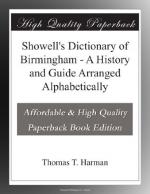Patriotic Fund.—The local collection for this fund was commenced October, 25, 1854, and closed February 22, 1858, with a total of L12,936 17s. 3d.
Paving.—A “patent” was obtained in 1319, 12th Edw. II., to “take toll on all vendible commodities for three years, to pave the town of Birmingham;” and as the funds thus raised were not sufficient for such a “town improvement,” another “patent” for the purpose was procured in 1333, 7th Edw. III., the toll being fixed at one farthing on every eight bushels of corn. What the paving was in the early part of the present century is best told in the following extract from Bissett’s “Magnificent Directory,” published in 1800:—
The streets are pav’d, ’tis
true, but all the stones
Are set the wrong end up, in shape of
cones;
And strangers limp along the best pav’d
street,
As if parch’d peas were strew’d
beneath their feet,
Whilst custom makes the Natives scarcely
feel
Sharp-pointed pebbles press the toe or
heel.
About 1819-20 the roadways were stoned with the aid of a steam paving-engine, supplied with a row of six heavy rammers, which dropped on the uneven stones and drove them into the roads, the engine moving about a foot after each series of blows. A wood roadway was laid in Moor Street in April, 1873; and in June, 1874, the Council decided also so to pave New Street, High Street, and Bull Street. At their meeting, June 1876, it was resolved to spend L30,000 a year for six years in paving streets, and they have done all that.
Pawnbrokers.—In December, 1789, a Bill was prepared for presentation to Parliament “to suppress all pawnbrokers within the town.” and to establish in lieu a general office for pledges. Wonder what our uncles thought of it.
Peace.—A branch of the Workmen’s Peace Association was formed December 18, 1871.
Pebble Mill Pool.—The last few years a favourite spot for suicides, no less than thirty-nine persons having drowned themselves there since 1875. Strangely enough there was not a single similar case in the four years preceding, and only three cases of accidental drownings in the last 27 years.
Peck Lane.—Originally called Feck Lane, leading out of New Street, next to the Grammar School, was closed and cleared for the Railway Station. Steep and narrow as the old thoroughfare was, it was at one time thought quite as much of as Bull Street.
Pearls and Pearl Fisheries.—A few small pearls are occasionally found enclosed in the nacre (or mother-of-pearl) of shells cut up for buttons, &c., but seldom of much value, though it is related that a few years back a pearl thus discovered by a workman, and handed over to his employer, was sold for L40, realising L150 afterwards. In March, 1884, Mr. James Webb, Porchester Street, had the good fortune to find a pearl weighing 31 grains in an Australian shell he was cutting up, and it has been valued at




